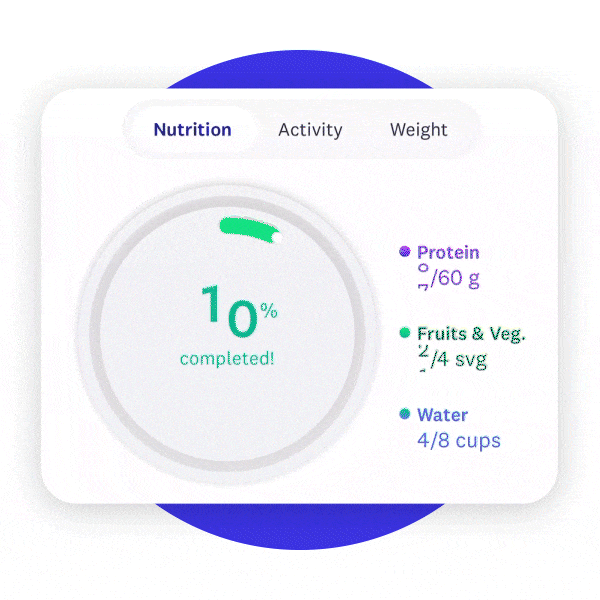GLP-1 Companion Program | WeightWatchers
Is medical weight-loss right for you?
Get tailored care and a medication plan, which may include GLP-1s.
^Not all members will medically qualify for prescription medications.
Taking a weight-loss medication?
Our GLP-1 companion program provides specially tailored nutrition guidance to help you feel your best.
The NEW GLP-1 Companion Program experience
Developed by our team of obesity specialists and behavior-change experts, the program and its tools work together to help you feel your best.

✔️ Daily targets that prioritize protein, water, and fruit and veggies.
✔️ GLP-1 Go-to Foods list takes some of the guesswork out of what to eat—even when you don’t feel like it.
✔️ Activity goals each day to help maintain muscle as you lose weight.
✔️ Essential toolkit with trackers, recipes, meal inspo, and behavior-change tips.
✔️ Support system of expert WW coaches, complimentary Virtual Workshops, and other members interested in GLP-1s.
Your essential weight-loss toolkit in one easy-to-use app—now easier to use and more effective than ever.
- Science-based nutrition plan
- 11,000+ recipes for healthier meal inspiration
- Weight and activity trackers
- 350+ no-track ZeroPoint® foods
- Easily track meals with a photo
- Barcode scanner and restaurant search
- Access to personalized meal planning with a Registered Dietitian^
- Supportive members-only digital community


Take the next step in your weight health journey and join WeightWatchers!
You’re almost there! Reach your goals, feel your best, and build healthy habits that last.
If you’re on GLP-1s, the GLP-1 Companion Program is your other half
Science shows that behavior change should be part of your journey too. And that’s kind of our thing.
The science behind the program
Not a chemistry lesson, more like a GLP-1 highlight reel to help you understand the why:

Less “food noise.”
We’re talking about those constant, intrusive thoughts about eating, even when you’re not hungry. The GLP-1 hormone also signals fullness to the brain.
✔️ Since it’s easier to focus on behavior-change strategies that build long-term healthy habits, we bring you all the science-backed tips and tricks.

Decreased appetite.
GLP-1s tell the stomach to empty more slowly, which leaves you feeling fuller for longer. You’ll likely find yourself eating less—and sometimes, not enough.
✔️ Our daily food targets help you prioritize nutritious foods so you stay nourished—and feeling your best.

Quicker weight loss.
This is common with second-gen GLP-1s. While it’s exciting to see progress, when you lose fat, you also lose muscle.
✔️ To help preserve the muscle you have, we added a protein target, daily activity target, and strength-training ideas.

A new way to look at losing weight.
Prescription weight-loss meds aren’t “the easy way out”—they’re just a different way in. But the experience can often feel isolating.
✔️ This isn’t a solo journey—everyone on the GLP-1 Companion Program access exclusive Virtual Workshops and chat with other members taking GLP-1s.

Less “food noise.”
We’re talking about those constant, intrusive thoughts about eating, even when you’re not hungry. The GLP-1 hormone also signals fullness to the brain.
✔️ Since it’s easier to focus on behavior-change strategies that build long-term healthy habits, we bring you all the science-backed tips and tricks.

Decreased appetite.
GLP-1s tell the stomach to empty more slowly, which leaves you feeling fuller for longer. You’ll likely find yourself eating less—and sometimes, not enough.
✔️ Our daily food targets help you prioritize nutritious foods so you stay nourished—and feeling your best.

Quicker weight loss.
This is common with second-gen GLP-1s. While it’s exciting to see progress, when you lose fat, you also lose muscle.
✔️ To help preserve the muscle you have, we added a protein target, daily activity target, and strength-training ideas.

A new way to look at losing weight.
Prescription weight-loss meds aren’t “the easy way out”—they’re just a different way in. But the experience can often feel isolating.
✔️ This isn’t a solo journey—everyone on the GLP-1 Companion Program access exclusive Virtual Workshops and chat with other members taking GLP-1s.
Curious about weight-loss meds?
We can help with that too. The WeightWatchers Clinic is about personalized, no stigma care:

Access to FDA-approved weight management meds, including GLP-1s
Take a five-minute quiz to see if you qualify. If you do, sign up to talk with a board-certified clinician to build a treatment plan.

Insurance coordination
We’ll help match you with a treatment that fits your budget.

1:1 support
Check in with clinicians for plan adjustments and questions about GLP-1s or other prescription medication.

Access to FDA-approved weight management meds, including GLP-1s
Take a five-minute quiz to see if you qualify. If you do, sign up to talk with a board-certified clinician to build a treatment plan.

Insurance coordination
We’ll help match you with a treatment that fits your budget.

1:1 support
Check in with clinicians for plan adjustments and questions about GLP-1s or other prescription medication.
Don’t just take our word for it
People living the program say it even better:
Meet our medical advisors
We rely on weight health experts—with the credentials to prove it.
Jamy Ard, M.D.
Codirector of Atrium Health Wake Forest Baptist Weight Management Center in Winston-Salem, North Carolina
Professor of epidemiology and prevention and medicine at Wake Forest University School of Medicine

Scott Kahan, M.D., MPH
Director of National Center for Weight and Wellness in Washington, D.C.

Angela K. Golden, D.N.P.
Doctor of nursing practice and owner of NP Obesity Treatment Clinic in Flagstaff, Arizona

Robert F. Kushner, M.D.
Director of Center for Lifestyle Medicine in Chicago
Professor of medicine and medical education at Northwestern University Feinberg School of Medicine in Evanston, Illinois
Ania Jastreboff, M.D., Ph.D.
Director of Yale Medicine Center for Weight Management in New Haven, Connecticut
Associate professor of medicine and pediatrics at Yale School of Medicine
Jamy Ard, M.D.
Codirector of Atrium Health Wake Forest Baptist Weight Management Center in Winston-Salem, North Carolina
Professor of epidemiology and prevention and medicine at Wake Forest University School of Medicine

Scott Kahan, M.D., MPH
Director of National Center for Weight and Wellness in Washington, D.C.

Angela K. Golden, D.N.P.
Doctor of nursing practice and owner of NP Obesity Treatment Clinic in Flagstaff, Arizona

Robert F. Kushner, M.D.
Director of Center for Lifestyle Medicine in Chicago
Professor of medicine and medical education at Northwestern University Feinberg School of Medicine in Evanston, Illinois
Ania Jastreboff, M.D., Ph.D.
Director of Yale Medicine Center for Weight Management in New Haven, Connecticut
Associate professor of medicine and pediatrics at Yale School of Medicine
Ready to see how powerful this path can be?
Wegovy, Zepbound, Ozempic, and Mounjaro are the trademarks of their respective owners.
*Based on a 2023 survey by Cerner Enviza of 500 doctors who recommend weight-loss programs to patients.
Frequently asked questions
If you’re already taking a second-gen GLP-1 (Wegovy, Ozempic, Zepbound, or Mounjaro) join WeightWatchers today. If you’re interested in weight-management meds, visit our new telehealth service, WeightWatchers Clinic for more info and to see if you qualify.
While the Points Program gives members a Points Budget, the GLP-1 Companion Program focuses on three daily nutrition targets: protein, fruits and veggies, and water. Both programs include activity targets, but the GLP-1 Companion Program target is daily. What’s not different: The award-winning WW app filled with recipe and meal inspo, trackers, and behavior-change tips. Plus, a strong support system of expert WW coaches and fellow members.
The program was designed for people who are using a second-gen GLP-1 prescription weight-management medication (Wegovy, Ozempic, Zepbound, or Mounjaro) and not living with diabetes. People taking a first-gen GLP-1 should follow the Points Program, and those living with diabetes should follow the Diabetes Program.
GLP-1s aren’t all the same. First-gen GLP-1s have a smaller impact on appetite and food noise than second-gen GLP-1s. As a result, they lead to less weight loss. The GLP-1 Companion Program was specifically designed to help those taking a second-gen GLP-1. People taking a first-gen GLP-1 should use our Points Program since it helps support weight loss with the milder reduction in appetite brought on by those meds.
While GLP-1s are prescribed to manage weight and diabetes, the GLP-1 Companion Program is designed for those taking them for weight management. People living with diabetes need a program that takes their condition into account, like our Diabetes Program. It encourages members to weigh, measure, and track the foods that may have the biggest impact on blood sugar levels. It also provides a list of ZeroPoint® foods that align with guidelines from the American Diabetes Association.
GLP-1s are prescription meds that mimic a naturally-occurring hormone. They were originally used to help control blood sugar and manage type 2 diabetes, but they have also been found to lead to weight loss. At the moment, there are three GLP-1s approved by the FDA for weight management: liraglutide (Saxenda), semaglutide (Wegovy), and tirzepatide (Zepbound).
We’ve always been dedicated to following the science of weight loss. As the medical community’s understanding of obesity has changed, so has the approach to treating it. For some, the Points Program works on its own. Others may need a lifestyle program and prescription weight-management medication. WeightWatchers will continue supporting all of our members.
No. It’s true that some people may benefit from pairing prescription weight-management medications with our program. But for many others, they’re successful on the Points Program alone.
No. The program is designed for everyone managing their weight with a second-generation GLP-1, no matter who their prescription provider is. If you already have a healthcare provider guiding your treatment, there’s no need to switch. If you’re still looking for one, WeightWatchers Clinic can connect you with board-certified clinicians trained in obesity medicine.
Everyone has the same targets for fruits and veggies (four servings per day), hydration (8 cups per day), and activity (30 minutes per day). That said, protein targets may be different since they are individualized based on what you weigh at the beginning of the program (0.8g of protein per 1 kg starting body weight). Ultimately, when it comes to your diet, always follow the recommendations as provided by your healthcare provider.
Everyone’s daily target is 30 minutes. This helps you work towards the expert recommendation of at least 150 minutes a week of moderate-intensity aerobic activity and strength training at least twice a week.
The GLP-1 Go-to Food list is made up of foods that form the foundation of a healthy eating pattern–especially for those taking prescription weight-management medications. It includes foods high in protein, as well as fruits and vegetables to help you reach your nutrition targets. Find it in the What to Eat tab.
Members on the GLP-1 Companion Program will receive complimentary access to tailored Virtual Workshops. You can access these through "Find a Workshop" in the WW app or here. There’s also a Connect group called “GLP-1 Companion Program” where you can interact with others interested in GLP-1s.
Right now, seven medications are approved by the FDA: bupropion-naltrexone (brand name: Contrave), semaglutide (brand name: Wegovy), liraglutide, (brand name: Saxenda), orlistat (brand names: Alli and Xenical), phentermine-topiramate (brand name: Qysmia), phentermine, and tirzepatide (brand name: Zepbound).
Ozempic is the brand name for a form of the GLP-1 drug semaglutide; right now it’s only FDA-approved to treat type 2 diabetes. That said, some physicians do prescribe it off-label for weight management. A higher-dose version of semaglutide, under the brand name Wegovy, is FDA-approved to treat obesity.
We’ll leave medication recommendations to medical experts. You should consult with a healthcare provider—whether a general practitioner or a clinician from WeightWatchers Clinic—to determine which, if any, chronic weight-management medications may be right for you.
It depends on the medication and the type of insurance you have. Newer generation medications can be very expensive ($900-$1200 a month in the US for out-of-pocket costs), and insurance companies vary greatly on whether and how much they cover.
The FDA has approved these medications for individuals living with obesity—defined as a body mass index (BMI) over 30—and also individuals with a BMI over 27 who have a qualifying health condition, such as type 2 diabetes, high blood pressure, or high cholesterol.
The quickie answer: most suppress your appetite. They do this by targeting your brain and gut to manage hunger and signal feelings of fullness.
Weight loss varies across medications, ranging from 5% to 15%, with newer medications producing the more significant results.
The consensus of the medical community—including both researchers and healthcare providers—is that lifestyle factors like food, activity, sleep, and mindset form the foundation for any weight-loss treatment, including prescription medication and even surgery. For people whose biology makes losing weight more challenging, medications help level the playing field—but they can’t make you eat healthier or move more or shift your mindset. Thus, experts say that these medications should be used as an adjunct to a lifestyle modification program.
These medications are designed to treat a chronic disease—obesity—and you have to take them long-term, alongside a lifestyle modification program, to optimize weight loss and health.
All medications have side effects, and your healthcare provider should go over them if and when you discuss medication options. Common side effects include nausea, vomiting, diarrhea, and constipation, with most patients experiencing mild to moderate symptoms that are relatively short-term. More serious side effects are also possible, but far less common.








